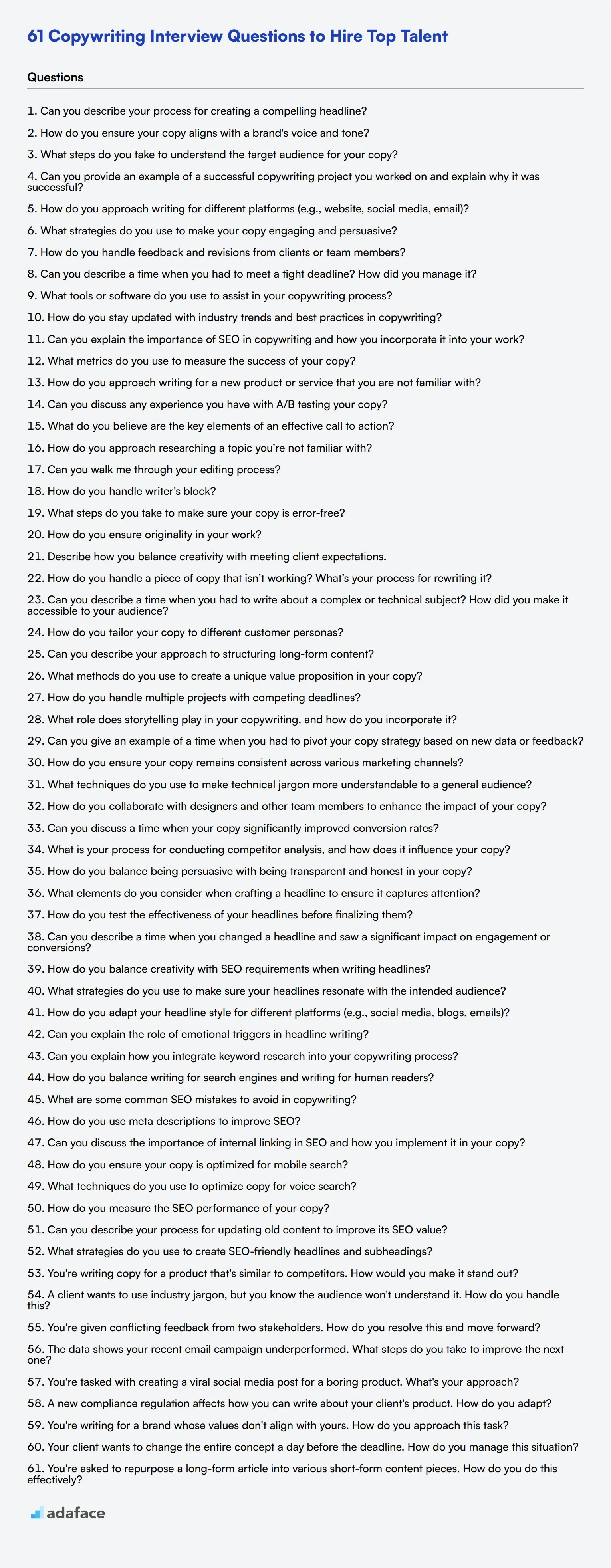In today’s competitive market, hiring the right copywriters can greatly impact your brand’s success. To ensure you identify top talent, it’s important to ask the right questions during interviews.
This blog post provides a comprehensive list of copywriting interview questions tailored for different experience levels, including junior and mid-tier copywriters. We’ve also included sections on creating compelling headlines, understanding SEO best practices, and situational questions for evaluating top copywriters.
By using these questions, you can streamline your interview process and make well-informed hiring decisions. Additionally, consider assessing candidates’ skills with our specialized Copywriting test to complement your interview strategy.
Table of contents
15 basic Copywriting interview questions and answers to assess candidates
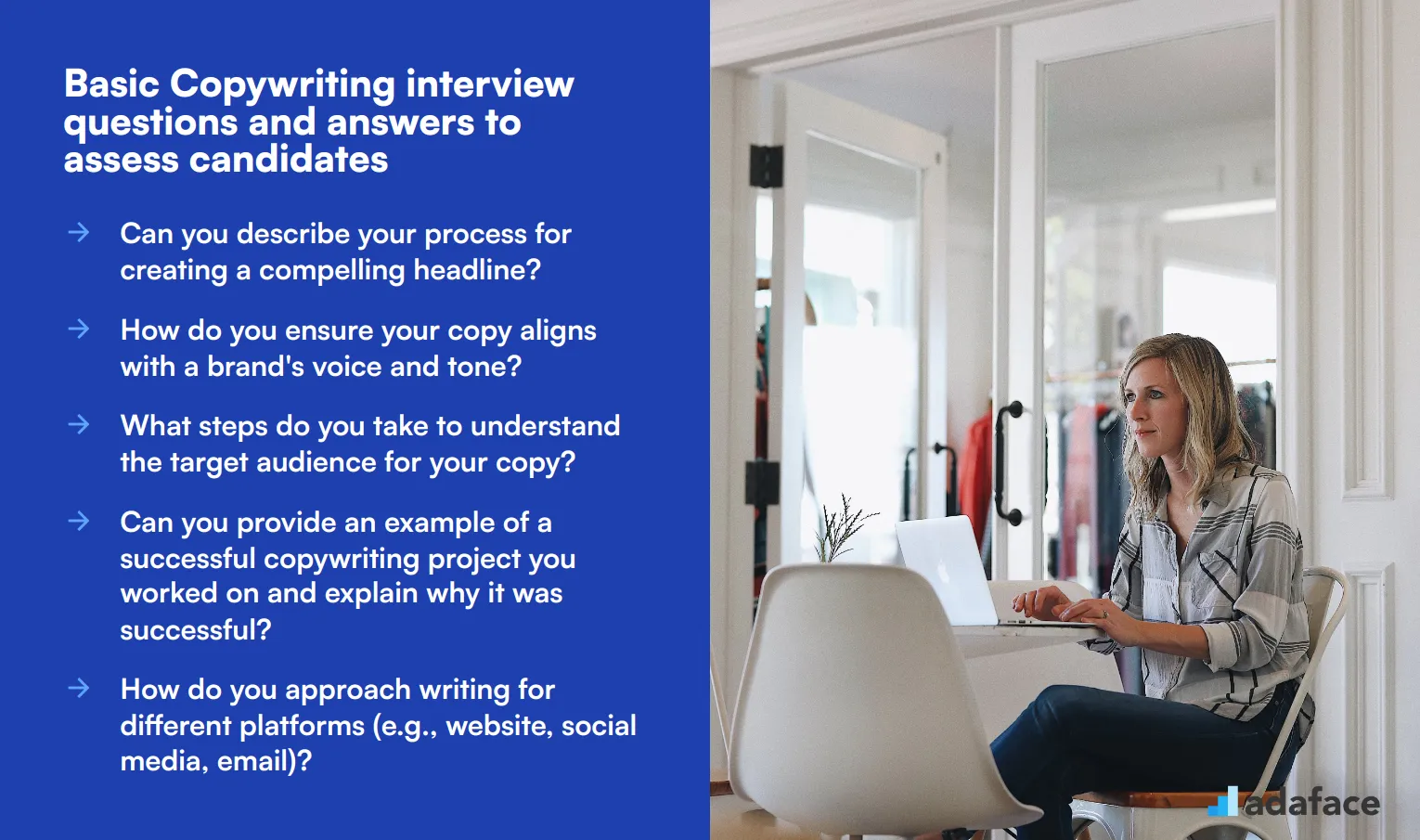
To determine whether your applicants have the right skills for the job, ask them some of these basic copywriting interview questions. These questions are designed to help you gauge their understanding and proficiency in key areas. For a comprehensive overview of the role, you can refer to this copywriter job description.
- Can you describe your process for creating a compelling headline?
- How do you ensure your copy aligns with a brand's voice and tone?
- What steps do you take to understand the target audience for your copy?
- Can you provide an example of a successful copywriting project you worked on and explain why it was successful?
- How do you approach writing for different platforms (e.g., website, social media, email)?
- What strategies do you use to make your copy engaging and persuasive?
- How do you handle feedback and revisions from clients or team members?
- Can you describe a time when you had to meet a tight deadline? How did you manage it?
- What tools or software do you use to assist in your copywriting process?
- How do you stay updated with industry trends and best practices in copywriting?
- Can you explain the importance of SEO in copywriting and how you incorporate it into your work?
- What metrics do you use to measure the success of your copy?
- How do you approach writing for a new product or service that you are not familiar with?
- Can you discuss any experience you have with A/B testing your copy?
- What do you believe are the key elements of an effective call to action?
8 Copywriting interview questions and answers to evaluate junior copywriters
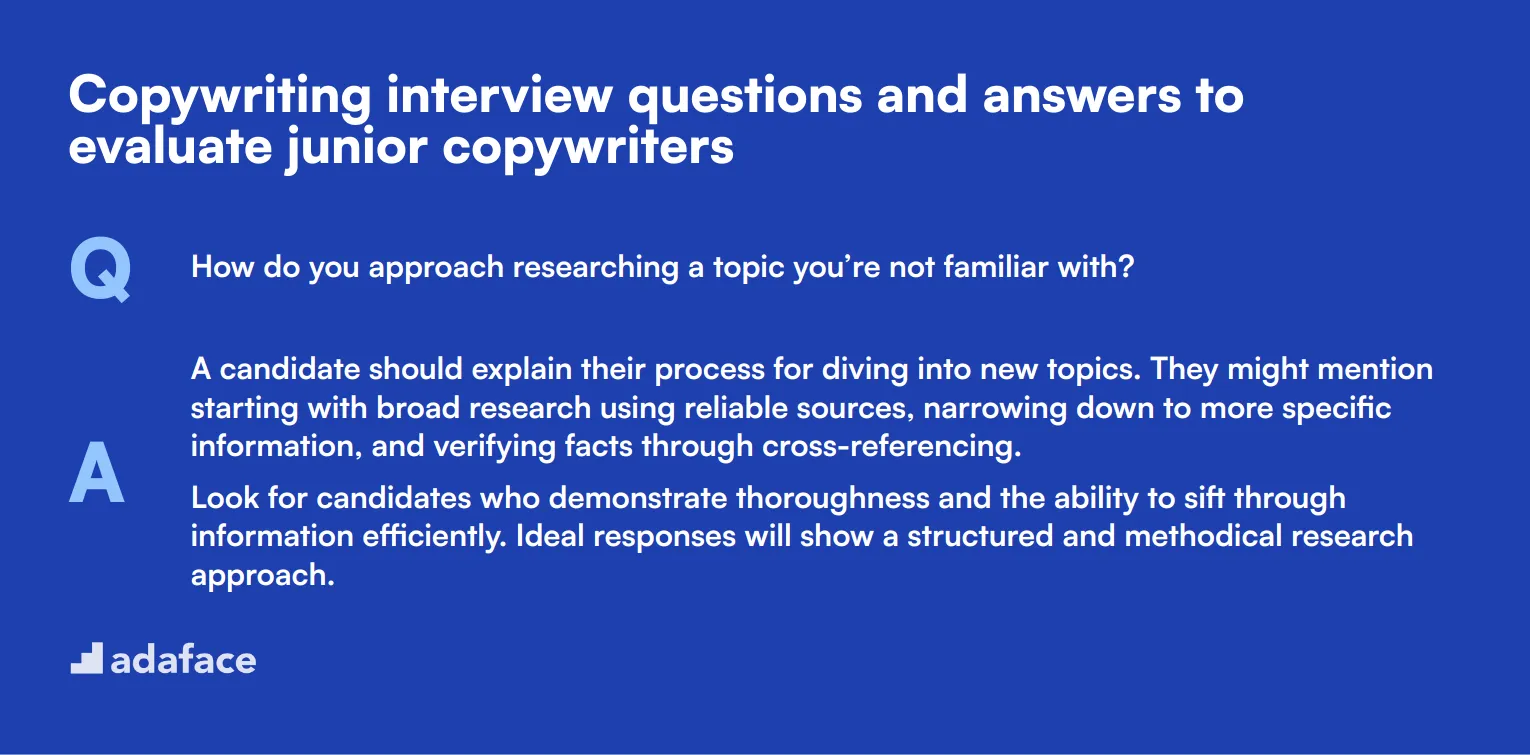
To effectively evaluate junior copywriters, you need a set of targeted questions that reveal their skills and thought processes. This list of questions will help you identify candidates who are capable of delivering compelling and on-brand copy under various conditions.
1. How do you approach researching a topic you’re not familiar with?
A candidate should explain their process for diving into new topics. They might mention starting with broad research using reliable sources, narrowing down to more specific information, and verifying facts through cross-referencing.
Look for candidates who demonstrate thoroughness and the ability to sift through information efficiently. Ideal responses will show a structured and methodical research approach.
2. Can you walk me through your editing process?
Candidates should outline the steps they take to refine their copy. This might include initial drafting, setting the draft aside before revisiting it with fresh eyes, checking for grammar and spelling errors, and making sure the content aligns with the brief and brand voice.
Strong responses will highlight attention to detail and a commitment to producing polished, error-free content. Look for mention of tools they use or specific techniques that ensure high-quality edits.
3. How do you handle writer's block?
Candidates may describe various strategies to overcome creative blocks, such as taking short breaks, changing their environment, brainstorming with colleagues, or revisiting their research for inspiration.
An ideal answer will show that the candidate has effective methods for maintaining productivity and creativity, even when faced with obstacles.
4. What steps do you take to make sure your copy is error-free?
A candidate should mention specific proofreading techniques, such as reading aloud, using grammar-check tools, or having a colleague review their work. They may also describe a systematic approach to catching errors in grammar, punctuation, and spelling.
Look for candidates who can articulate a clear and reliable process for ensuring their copy is polished and professional, showcasing their attention to detail.
5. How do you ensure originality in your work?
Candidates should explain their methods for generating unique ideas and avoiding plagiarism. This might include brainstorming sessions, drawing inspiration from diverse sources, and using plagiarism detection tools to double-check their work.
A strong answer will show that the candidate values originality and has concrete steps in place to produce fresh and authentic content consistently.
6. Describe how you balance creativity with meeting client expectations.
A candidate should demonstrate an understanding of harmonizing creative ideas with client briefs. They might mention starting with a clear understanding of the client's needs, followed by brainstorming and presenting ideas that align with those needs.
Ideal responses will show the candidate's ability to remain imaginative while respecting client constraints, ensuring a balance between artistic flair and practical requirements.
7. How do you handle a piece of copy that isn’t working? What’s your process for rewriting it?
Candidates should describe their approach to identifying issues in their copy and how they go about revising it. This might include soliciting feedback, revisiting the brief, and rethinking the structure or tone of the content.
Look for candidates who show resilience and a systematic approach to making improvements, indicating their commitment to delivering high-quality work even when initial drafts fall short.
8. Can you describe a time when you had to write about a complex or technical subject? How did you make it accessible to your audience?
Candidates should provide an example where they broke down a complex topic into digestible parts. They might mention simplifying jargon, using analogies, and structuring the content logically to guide the reader.
An ideal response will illustrate the candidate’s ability to communicate intricate information clearly and effectively, ensuring it resonates with the target audience.
12 intermediate Copywriting interview questions and answers to ask mid-tier copywriters
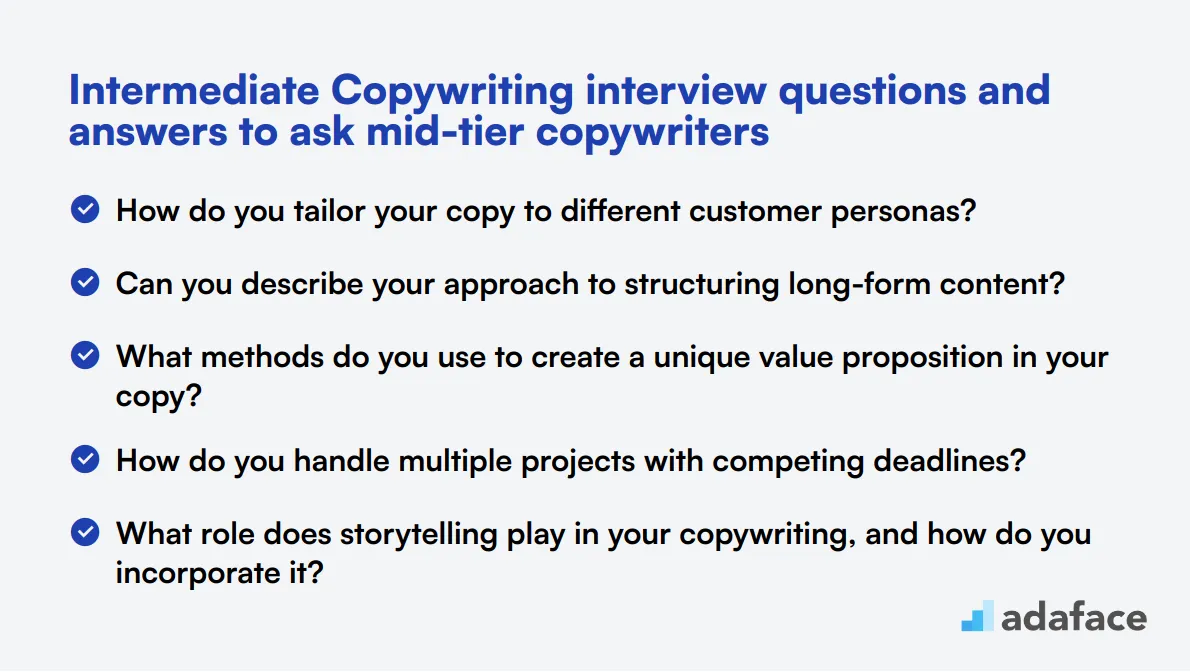
To evaluate mid-tier copywriters effectively, use these 12 intermediate interview questions. These questions will help you assess whether candidates have the necessary skills to handle more complex copywriting tasks and align with your content writer job description.
- How do you tailor your copy to different customer personas?
- Can you describe your approach to structuring long-form content?
- What methods do you use to create a unique value proposition in your copy?
- How do you handle multiple projects with competing deadlines?
- What role does storytelling play in your copywriting, and how do you incorporate it?
- Can you give an example of a time when you had to pivot your copy strategy based on new data or feedback?
- How do you ensure your copy remains consistent across various marketing channels?
- What techniques do you use to make technical jargon more understandable to a general audience?
- How do you collaborate with designers and other team members to enhance the impact of your copy?
- Can you discuss a time when your copy significantly improved conversion rates?
- What is your process for conducting competitor analysis, and how does it influence your copy?
- How do you balance being persuasive with being transparent and honest in your copy?
7 Copywriting interview questions and answers related to creating compelling headlines
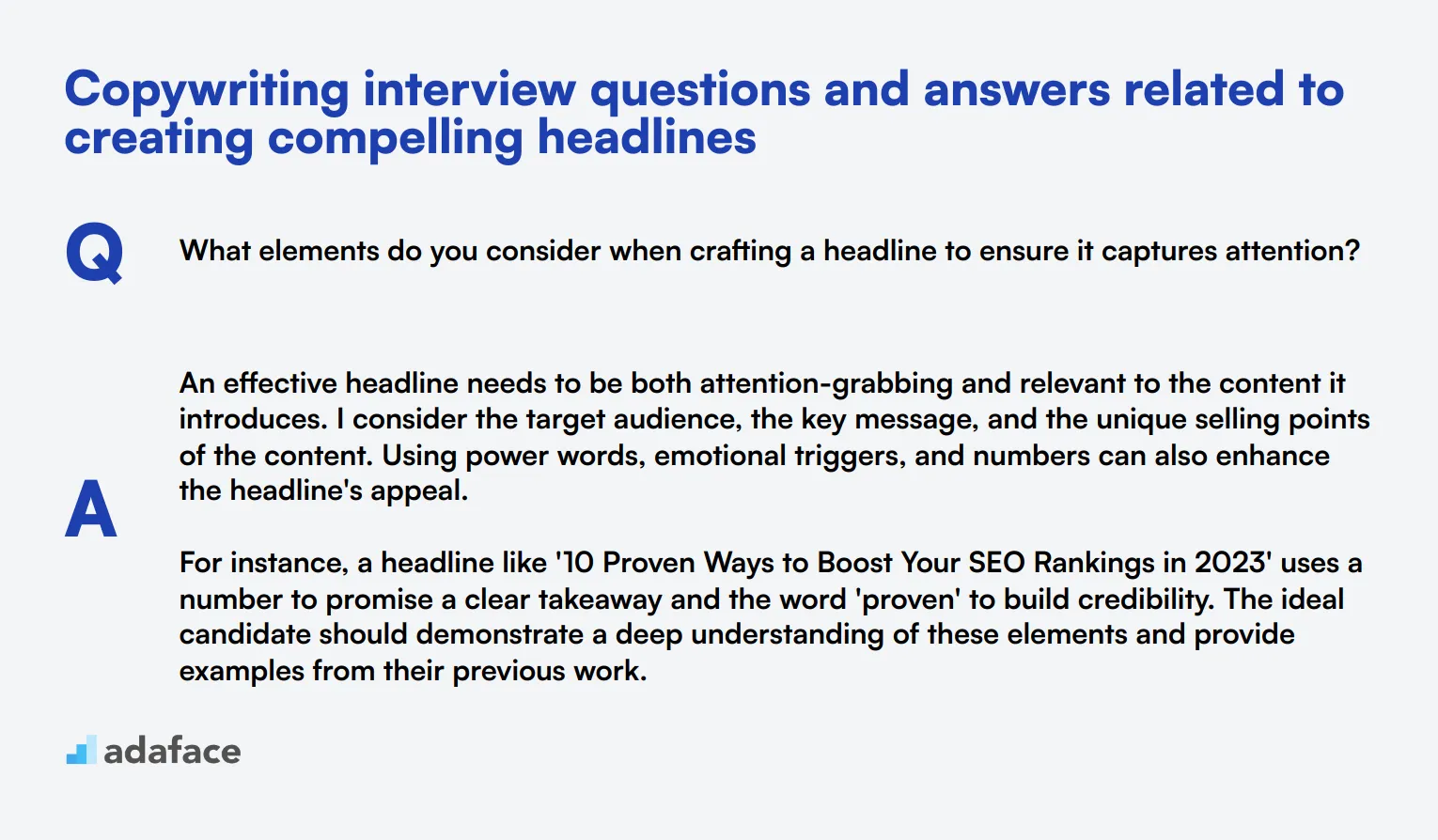
To determine whether your applicants can craft headlines that grab attention and convert readers, ask them some of these targeted copywriting interview questions. These questions will help you assess their creativity, understanding of audience psychology, and ability to align with your brand’s voice.
1. What elements do you consider when crafting a headline to ensure it captures attention?
An effective headline needs to be both attention-grabbing and relevant to the content it introduces. I consider the target audience, the key message, and the unique selling points of the content. Using power words, emotional triggers, and numbers can also enhance the headline's appeal.
For instance, a headline like '10 Proven Ways to Boost Your SEO Rankings in 2023' uses a number to promise a clear takeaway and the word 'proven' to build credibility. The ideal candidate should demonstrate a deep understanding of these elements and provide examples from their previous work.
2. How do you test the effectiveness of your headlines before finalizing them?
Testing headlines can be done through A/B testing, where two different headlines are presented to a segment of the audience to see which one performs better. I also use tools like headline analyzers to get immediate feedback on the potential effectiveness of a headline.
Effective candidates will mention specific tools and methods they use, such as social media engagement metrics or email open rates, to measure the success of their headlines. Look for candidates who can explain their process clearly and provide data-driven insights.
3. Can you describe a time when you changed a headline and saw a significant impact on engagement or conversions?
In a previous role, I changed a headline from 'How to Improve Your Marketing Strategy' to '5 Game-Changing Strategies to Skyrocket Your Marketing Success'. The new headline resulted in a 30% increase in click-through rates. The change was driven by adding a quantifiable promise and a more compelling call to action.
Candidates should be able to provide specific examples and metrics to illustrate the impact of their headline changes. This demonstrates not only their creativity but also their ability to analyze and improve performance.
4. How do you balance creativity with SEO requirements when writing headlines?
Balancing creativity with SEO involves including target keywords without compromising the headline's appeal. I aim to integrate keywords naturally while still making the headline intriguing and engaging. For example, a headline like 'Unlock the Secrets of SEO Success' includes a target keyword ('SEO') but remains compelling.
An ideal candidate should show an understanding of both creative and technical aspects. Look for responses that mention specific strategies or tools for integrating SEO without losing the headline's impact.
5. What strategies do you use to make sure your headlines resonate with the intended audience?
To ensure headlines resonate with the audience, I conduct thorough research on the target demographic, including their pain points, interests, and language preferences. I also analyze competitor headlines to see what works well in the industry.
Candidates should emphasize the importance of understanding the audience and provide examples of how audience insights influenced their headline choices. Look for a structured approach that includes research, testing, and iteration.
6. How do you adapt your headline style for different platforms (e.g., social media, blogs, emails)?
Different platforms require different headline styles. For social media, headlines need to be short and attention-grabbing due to limited space and fast-scrolling behavior. For blogs, they can be more descriptive and SEO-focused. For emails, personalization and urgency often work best.
Effective candidates will mention the importance of tailoring headlines to fit the platform's unique context and user behavior. They should provide examples of how they have successfully adapted headlines across various platforms.
7. Can you explain the role of emotional triggers in headline writing?
Emotional triggers play a crucial role in headline writing as they can significantly increase engagement. By evoking emotions like curiosity, excitement, or even fear, a headline can compel readers to click through. For example, a headline like 'Are You Making These Common Marketing Mistakes?' triggers fear of missing out (FOMO) and prompts action.
Candidates should show an understanding of different emotional triggers and how to use them effectively. They should provide examples that demonstrate their ability to connect with readers on an emotional level.
10 Copywriting interview questions about SEO best practices
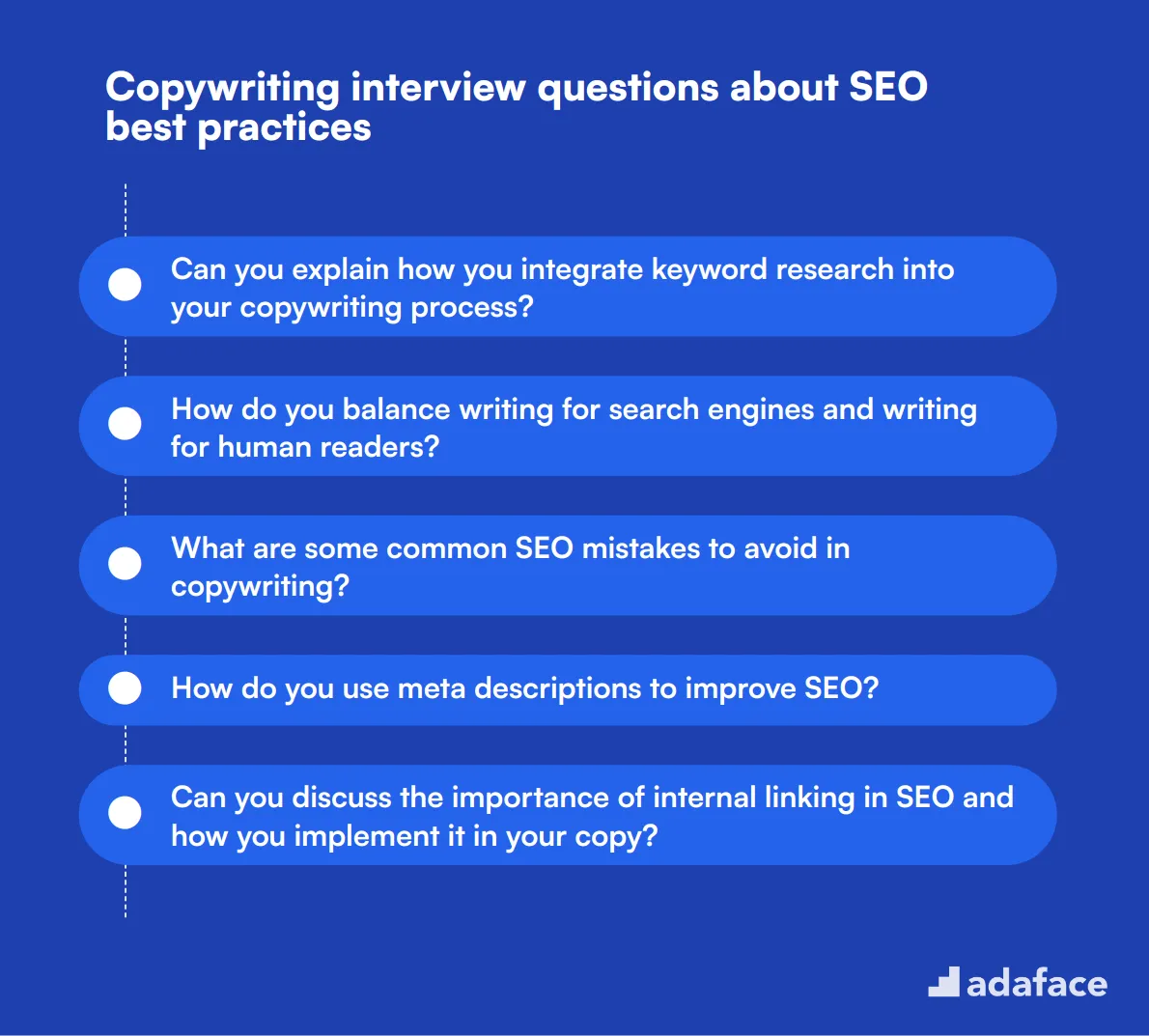
To assess whether candidates possess a robust understanding of SEO best practices in copywriting, use this curated list of questions during interviews. These questions are designed to gauge their practical knowledge and ability to integrate SEO seamlessly into their writing. For more insights, you might want to check out SEO copywriter job description.
- Can you explain how you integrate keyword research into your copywriting process?
- How do you balance writing for search engines and writing for human readers?
- What are some common SEO mistakes to avoid in copywriting?
- How do you use meta descriptions to improve SEO?
- Can you discuss the importance of internal linking in SEO and how you implement it in your copy?
- How do you ensure your copy is optimized for mobile search?
- What techniques do you use to optimize copy for voice search?
- How do you measure the SEO performance of your copy?
- Can you describe your process for updating old content to improve its SEO value?
- What strategies do you use to create SEO-friendly headlines and subheadings?
9 situational Copywriting interview questions for hiring top copywriters
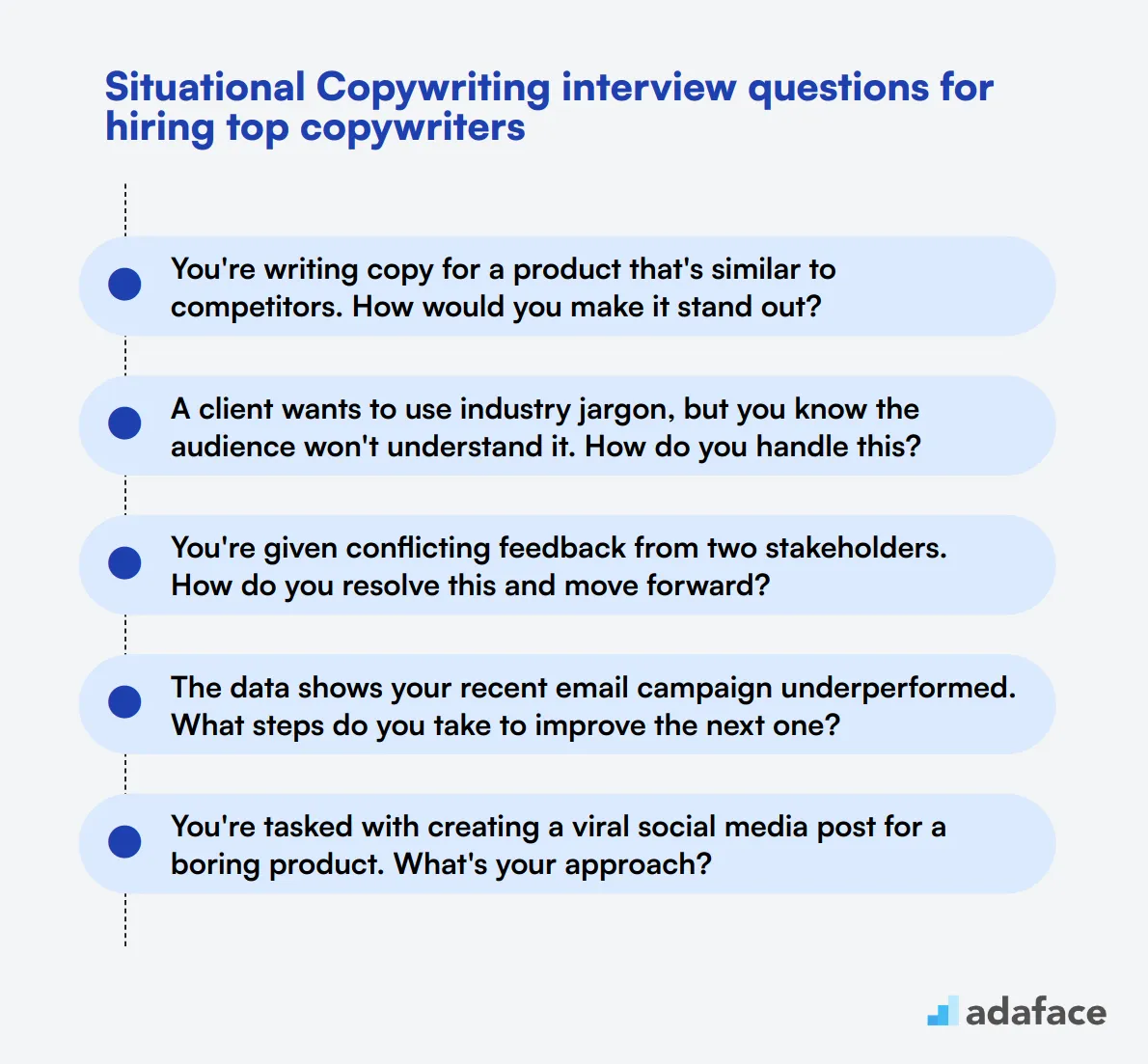
To assess a candidate's ability to handle real-world copywriting challenges, use these situational interview questions. They help evaluate how applicants approach common scenarios in copywriting careers. Ask these questions to gauge problem-solving skills and creative thinking in practical contexts.
- You're writing copy for a product that's similar to competitors. How would you make it stand out?
- A client wants to use industry jargon, but you know the audience won't understand it. How do you handle this?
- You're given conflicting feedback from two stakeholders. How do you resolve this and move forward?
- The data shows your recent email campaign underperformed. What steps do you take to improve the next one?
- You're tasked with creating a viral social media post for a boring product. What's your approach?
- A new compliance regulation affects how you can write about your client's product. How do you adapt?
- You're writing for a brand whose values don't align with yours. How do you approach this task?
- Your client wants to change the entire concept a day before the deadline. How do you manage this situation?
- You're asked to repurpose a long-form article into various short-form content pieces. How do you do this effectively?
Which Copywriting skills should you evaluate during the interview phase?
While it's impossible to assess every aspect of a candidate's capabilities in a single interview, there are certain core skills that are essential for copywriting success. Focusing on these skills during the interview phase will help you better evaluate a candidate's potential impact on your team and projects.
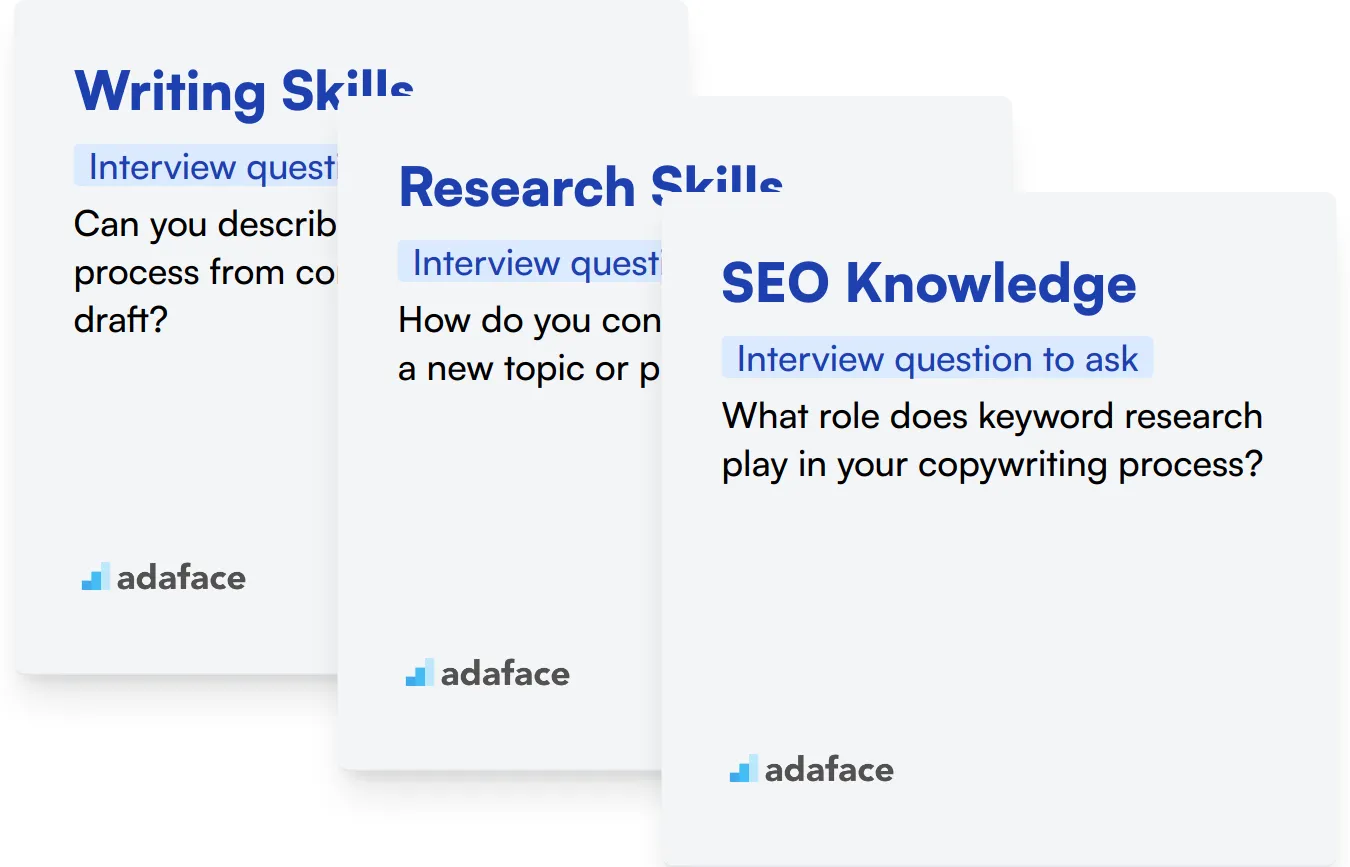
Writing Skills
To gauge a candidate's writing skills, consider administering a brief assessment that includes relevant multiple-choice questions. This can help filter out candidates who may lack the necessary proficiency in writing.
In addition to assessments, asking targeted interview questions can provide deeper insights into a candidate's writing abilities. One effective question to consider is:
Can you describe your writing process from concept to final draft?
When this question is asked, look for a structured approach and attention to detail in their response. A good candidate should articulate their process clearly, highlighting how they plan, draft, revise, and edit their work.
Research Skills
To evaluate a candidate's research skills, consider using an assessment that includes multiple-choice questions related to research methodologies and best practices.
You can also ask candidates specific questions regarding their research practices. One insightful question is:
How do you conduct research for a new topic or project?
When discussing their research methods, pay attention to their ability to identify reliable sources and how they integrate findings into their writing. A strong candidate will demonstrate a systematic approach to gathering and applying information.
SEO Knowledge
To assess a candidate's SEO knowledge, consider implementing an assessment with multiple-choice questions focused on SEO best practices and strategies.
You can also gauge their understanding of SEO during the interview by asking:
What role does keyword research play in your copywriting process?
Look for candidates who can articulate the importance of keyword research in driving traffic and improving visibility. A knowledgeable candidate should explain how they use keywords strategically without compromising content quality.
3 Strategic Tips for Leveraging Copywriting Interview Questions
Before you start applying the insights from this post, here are some expert tips to enhance your interviewing strategy and ensure you’re fully prepared to assess potential candidates.
1. Incorporate Skill Tests Early in the Recruitment Process
Implementing skill tests prior to interviews can significantly streamline your recruitment process by ensuring only qualified candidates reach the interview stage. This approach saves time and resources while maintaining high standards.
For assessing copywriting aptitude, consider utilizing tests like the Copywriting Test, Content Strategy Test, and SEO Assessment Test. These tests evaluate core competencies essential for success in copywriting roles.
By integrating these assessments, you can focus interview time on deeper insights into candidates' strategic thinking and creativity rather than confirming basic skills. This targeted approach allows for a more effective evaluation of their potential fit within your team.
2. Carefully Select and Tailor Your Interview Questions
Given the limited time in interviews, selecting the right questions is key to effectively assess essential skills and qualities. Focus on crafting a list that covers diverse aspects of copywriting and related fields without overwhelming the candidate or interviewer.
Explore incorporating questions from related areas like digital marketing or SEO to get a holistic view of the candidate’s capabilities. Questions from resources like Digital Marketing Test and detailed queries on SEO best practices can provide insights beyond basic writing skills.
This tailored approach ensures that you cover all necessary subskills and related competencies, making your evaluation both thorough and efficient.
3. Emphasize the Importance of Follow-Up Questions
While having a solid set of primary interview questions is important, follow-up questions can be just as critical. They help gauge the depth of a candidate's knowledge and their ability to think on their feet.
For example, if a candidate describes their approach to crafting a headline, a strong follow-up could be, 'Can you explain how you would adapt that headline for a different audience?' This not only tests adaptability but also deeper strategic thinking relevant to the role.
Utilizing Skill Tests and Interview Questions to Hire Skilled Copywriters
When hiring copywriters, confirming their competency in relevant skills is key. The most effective way to assess these abilities is through targeted skill tests. Consider using our Copywriting Test or the SEO Assessment Test to accurately evaluate their capabilities.
After employing these tests, you'll be able to efficiently shortlist the most qualified candidates for interviews. To streamline this process further, direct your recruitment efforts through our sign-up page or explore more about our offerings on our online assessment platform page.
Copywriting Skills Test
Download Copywriting interview questions template in multiple formats
Copywriting Interview Questions FAQs
Look for strong writing skills, creativity, understanding of audience targeting, SEO knowledge, and adaptability to different tones and styles.
Ask questions about keyword research, meta descriptions, and how they incorporate SEO best practices into their writing process.
Junior questions focus on basic skills and theory, while mid-tier questions delve into more complex strategies and real-world application.
Situational questions are valuable for assessing how candidates apply their skills to real-world scenarios and handle challenges.
Yes, a writing test can provide practical insight into a candidate's skills and complement the interview questions effectively.

40 min skill tests.
No trick questions.
Accurate shortlisting.
We make it easy for you to find the best candidates in your pipeline with a 40 min skills test.
Try for freeRelated posts
Free resources




